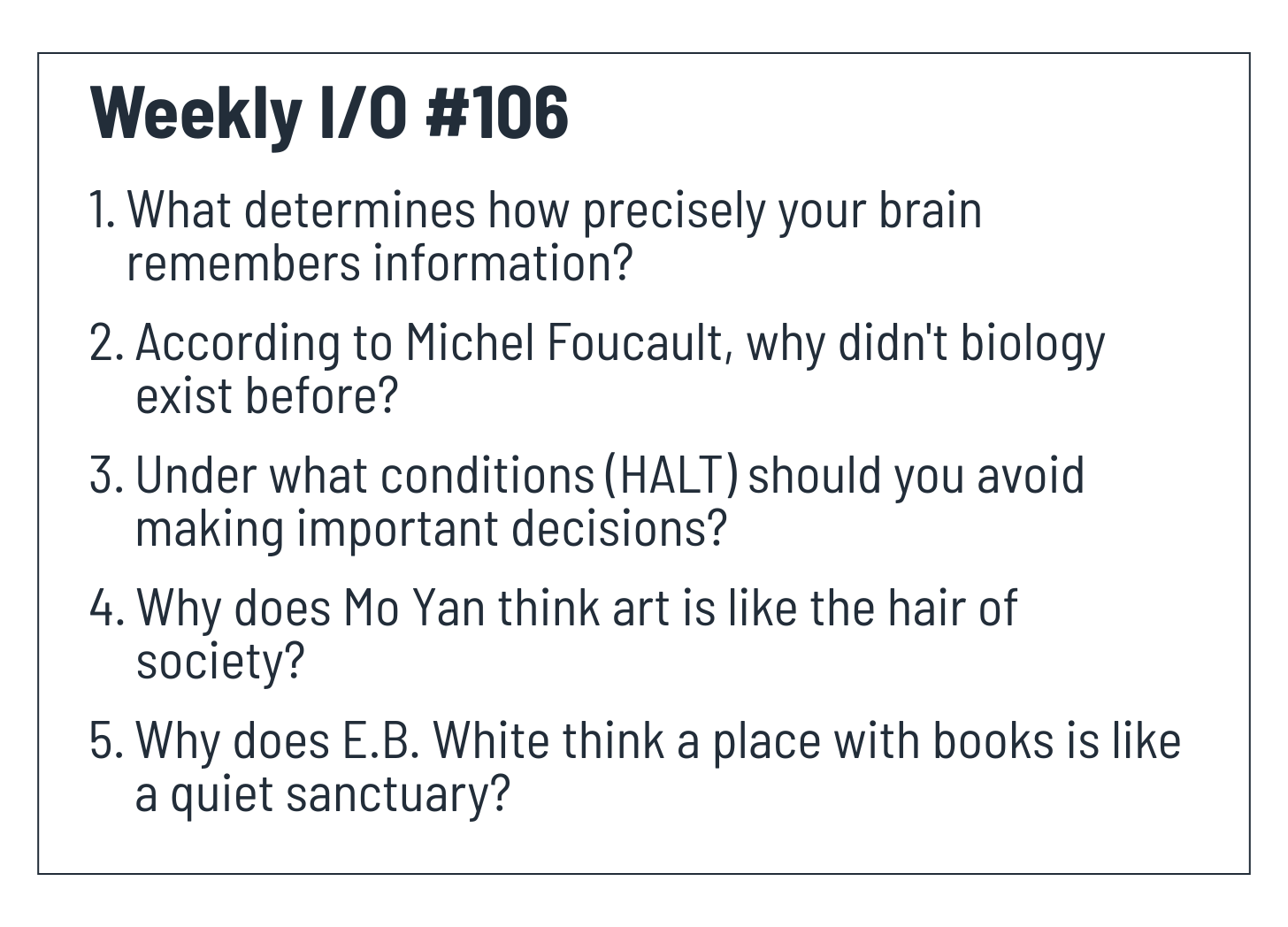Why we remember, Hidden rules of knowledge, HALT when making decisions
Weekly I/O #106: Predicted Utility and Memory Fidelity, Foucault and Hidden Rules of Knowledge, HALT When Making Decisions, Art is like Hair, Books are Friendship
In case you missed the last update, Weekly I/O is now available in Chinese! If you're a paid subscriber, you can receive all future Chinese translations directly and for free. Simply reply to this email, and I'll add you to the list.
If you upgrade your subscription now, you can also receive both English and Chinese versions. I hope it's helpful!
Hi friends,
Here's a list of things I enjoyed learning this week:
I recently traveled to New York City and visited my favorite bookstore, where I picked up and reread E.B. White's Here Is New York. It's a perfect book in a perfect place during a perfect time.
The reading experience felt magical, but I wonder if AI will soon be able to provide a similar experience. (Emotionally, I hope not.)
Here's a question I once found stupid, but probably not anymore: Will AI also replace the emotional functions of books?
Input
Here's a list of what I learned this week.
1. How well we remember things is based on the brain's prediction of its usefulness in a given situation. Predicted utility influences fidelity of memory representations in the brain.
Paper: Predicted utility modulates working memory fidelity in the brain
Why do we remember important information easily while trivial details oftentimes quickly fade away almost unconsciously?
It turns out our brain anticipates which information we will likely need again and gives it extra attention in working memory. Researchers refer to this as "predicted utility."
Researchers studied this by presenting participants with patterns to remember. When participants knew beforehand exactly which pattern was important, they remembered it with higher precision. Conversely, when they learned afterward, the patterns were remembered less clearly.
Brain scans also backed this up. The researchers used fMRI to investigate whether predicted utility influences fidelity of memory representations in the brain. Patterns predicted to be most useful were maintained in memory with greater fidelity, even when memory load remained constant.
In simpler terms, our brain actively prioritizes important information by making it clearer and more precise in our memory, regardless of the number of things we're trying to remember.
Moreover, this occurred even when participants had only a single pattern to remember. This means the brain wasn't just redistributing limited resources among multiple items. Instead, the brain proactively allocates resources, almost like reserving memory space ahead of time for what matters most.
This study also perfectly explains why taking an exam before learning the subject can enhance future learning of that subject.
2. Historical periods have unique and often hidden assumptions that shape the structure of knowledge, making past ways of thinking fundamentally distinct from our own today.
Book: The Order of Things
“Historians want to write histories of biology in the eighteenth century; but they do not realize that biology did not exist then, and that the pattern of knowledge that has been familiar to us for a hundred and fifty years is not valid for a previous period.”
Why didn't biology exist before?
French philosopher Michel Foucault suggests that each historical era has its hidden assumptions that define what counts as knowledge. He called these invisible assumptions "epistemes".
For example, in the eighteenth century, the concept of biology as a systematic study of life did not exist. Instead, people studied "natural history". They categorize animals and plants, but never investigate the underlying biological processes. And surprisingly, this approach to understanding life was more closely connected to their economic ideas than to anything resembling modern biology.
Another example is how language changed over time. Previously, language was considered merely a representation of ideas. After Immanuel Kant, language evolved into its own distinct field of study. Mallarmé famously answered Nietzsche's question "Who is speaking?" with "Language itself." Literature is neither resemblance nor representation, but becomes a force of its own, with branches like analytical philosophy, with our Weekly I/O's best friend, Wittgenstein.
These changes demonstrate that knowledge is never timeless or universal. Rather, each era shapes its understanding through hidden rules it unconsciously accepts.
What we see as obvious truths today might be strange or even laughable to future generations. The other direction might also be true: every breakthrough is at first laughable and ridiculous.
3. Avoid making any important decision when you are either hungry, angry, lonely, or tired (HALT). Just halt when you are HALT.
Article: The Technium: 101 Additional Advices
Our decision-making quality is highly dependent on our conditions. Research shows that a judge who has just eaten a meal is significantly more likely to grant a defendant's request than a hungry judge. This phenomenon is known as the hungry judge effect.





